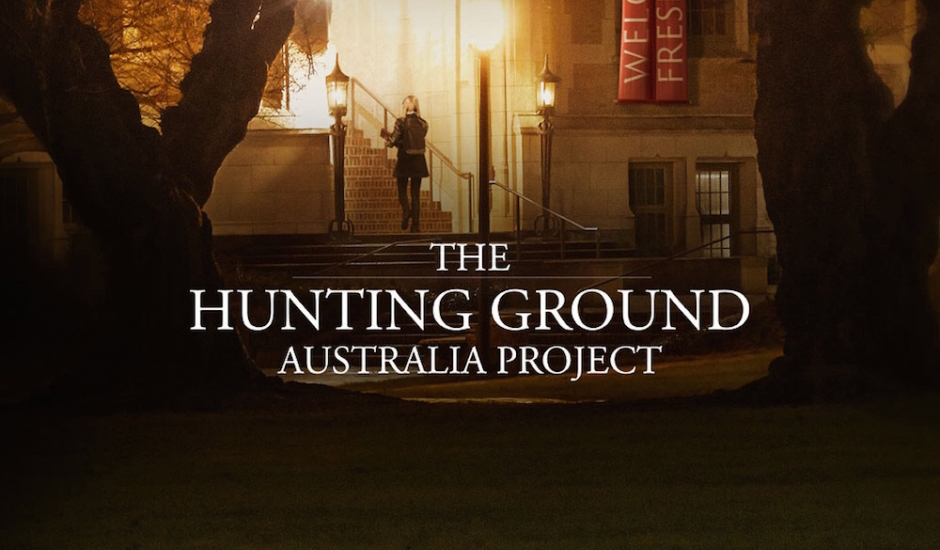 2:24PM On A Sunday, Reaching For The 12th BiscuitA self help guide for hungover existentialists.
2:24PM On A Sunday, Reaching For The 12th BiscuitA self help guide for hungover existentialists.

The Hunting Ground: The Australia Project
A chat with Impact Producer Allison Henry about American documentary The Hunting Ground coming to Australia.
To learn more about the original film The Hunting Ground, check out this in-depth piece HERE.
Yes, Australian universities do not have fraternities, nor multi-million dollar sport teams or the majority of our students living on campus. However, sexual harassment and violence towards women has never been more in the spotlight in Australia than it has in the last few months. It’s becoming clearer and clearer that Australia does have an issue with sexual ethics towards women. I had a chat with Allison Henry, Impact Producer for The Hunting Ground Australia Project, about the campaign and why Australian universities need to be proactive about sexual violence.
If you go and Google ‘Australian university sexual assault statistics’ one of the first article that pops up is ‘Survey of sexual assaults on university campuses shelved’. Strange. I ask Henry if she could shed some light on the magnitude of sexual assault here amongst Australian university students: “We don’t actually know what the situation is here in Australia” she said. This is not necessarily because we have an impeccable squeaky-clean university culture. "The film contains a lot of statistics around what the situation is in the United States but when you go and look for information here in Australia those statistics just don’t exist."
In 2014 Australian universities postponed plans to investigate sexual assault on their campuses. The most recent statistics are the National Union of Students ‘Talk About It’ survey' in 2015. However, the survey was limited to female students and had just over 1000 responses.
It’s astounding that we have not comprehensively investigated such a topical issue. In her initial research Henry travelled around the country speaking to university students about their experiences with sexual assault. Her worst fears were only confirmed: “Everyone I spoke to who lived on campus knew heaps of stories; knew somebody that something had happened to; and that made me think probably it was a problem in Australia, we just didn’t know what the extent of it was,” she tells. “When we’ve been showing this film people have been saying; people who work in universities, students; they’ve said, ‘This is relevant, this is happening here’."
How exactly? "The issue that comes up fairly consistently is alcohol," Henry responds. Due to our lower drinking age Aussie students are exposed to alcohol at a much younger age and don’t need to turn to fraternities to consume mass sums of it, which Henry says is one of the key factors leading to sexual assaults and rape. Henry says the other dynamic in Australia is our sporting culture; not necessarily on-campus, but in general. Despite significant differences between Aussie and American university cultures, there does seem to be those common denominators of booze and sport that surround the problem.
So even though we don’t have substantive data on the matter - we do have a few snapshots. This year, numerous stories have popped up on our newsfeeds putting sexual violence and harassment towards women in the spotlight across the nation.
In Queensland, a bake sale aimed at promoting feminism turned sour when men came out against the campaign. Organizers were subjected to sexist online abuse and threats such as “kill all women” and “I’m going to rape the feminist c***s that shows up to this event”.

10 days later, the University of Melbourne found itself under fire after a Facebook page rating the attractiveness of female students was exposed. The ‘Hotties of Melbourne University’ page was taken down after students came out against the predatory nature of the page and its 13,000 followers.

A few days later, a video was leaked of a group of young men chanting a horrendous song (a 20 year tradition apparently) on a bus for their annual ‘Boys Night Out’. The boys were all from The University of New South Wales and residents of Phillip Baxter College.
With three stories in one month the public turned to social media. On Twitter EverydaySexism started trending #WhenIWas, a campaign allowing thousands of women to come forward with stories of sexual abuse and harassment.

Most recently the University of Sydney has become the latest university to become embroiled in a scandal. A journal published by male students of Wesley College in 2014 essentially slut shamed female students. Days later, another sexist initiation of the college ritual was condemned.

Thus, The Hunting Ground Australia Project aims to tackle this unexplored territory in Australian universities. If all goes well, it can reach 1.3 million university students. Part one, was a national screening program. “We’ve done about 25 preview screenings to universities around the country and we’ve had staff from about 85% of Australian universities come and see the film,” Henry explains. "Uni’s can also apply to screen the film themselves," she added (click HERE to organise a screening).
Part two of the project is crucial to Henry. An independent national survey will be rolled out to universities later this year to act as one of the first comprehensive data bases on student experiences with sexual assault at Australian universities: “It’s going to be a really important data set and if we have an evidence base that is coherent and has a large number of students involved, that really gives us the potential to really try and change around these issues," Henry states.
Part three is being led by the UNSW who are researching and developing a model protocol that universities can utilise in cases and disclosures of sexual assault. Universities Australia has partnered with THGAP to launch a simultaneous campaign called Respect. Now. Always to help promote resources and services to students in regards to sexual violence. UA Vice-Chancellor Professor Ian Jacobs expressed similar sentiments to Henry: “This groundbreaking work appears to be the first in the world where a national university sector has decided to work together on these issues on such a scale”.
The final stage of the project will encompass a training package for students and staff. “The response a student gets to a disclosure…is so critical for how they cope going forward and how they recover, and also so critical if they do go on and report it to authorities,” Henry emphasises. She says the package would hopefully act as a preventive measure, teaching students about consent, respect etc.
It’s going to be a long-road for Australian universities but it’s a journey worth pursuing for Henry and her team. Most importantly, the project may be the definitive movement that exposes the realities of sexual violence amongst Australian university students. But Henry said if people want to see results and change; we as students, parents, and educators need to do three things; watch the film, get our universities involved with the project, and complete the survey to be rolled out later this year. We are already seeing brave students speak out against their universities. If we can support and encourage more students to do so, we might be able to confront this issue head-on and give it the attention it absolutely deserves.
To get involved with The Hunting Ground Australia Project click here for more info. To read up on the original documentary head HERE.
 2:24PM On A Sunday, Reaching For The 12th BiscuitA self help guide for hungover existentialists.
2:24PM On A Sunday, Reaching For The 12th BiscuitA self help guide for hungover existentialists.
 Imagination, Empathy & The Importance Of LiteratureIn a world where technology threatens our very existence, literature holds the key to unlocking the power we all have within us.
Imagination, Empathy & The Importance Of LiteratureIn a world where technology threatens our very existence, literature holds the key to unlocking the power we all have within us.